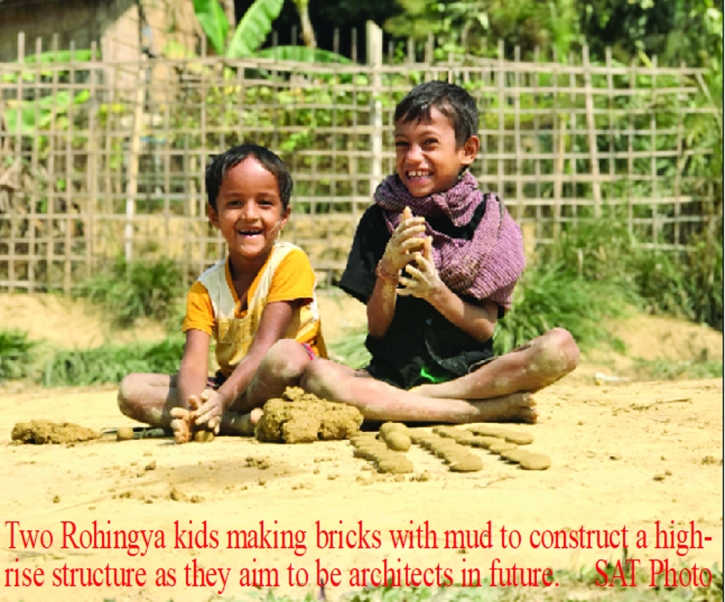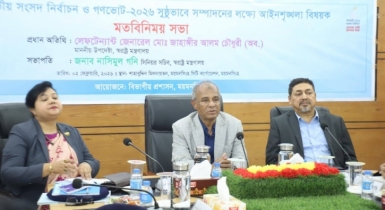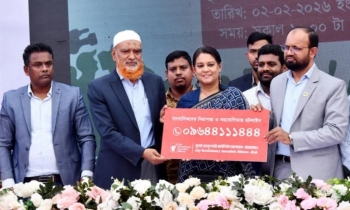
The Rohingya children are currently facing severe risks, including trafficking, child marriage, exploitation, and abuse. Their lack of access to basic human needs, such as education and hope, puts them at a higher risk of engaging in anti-social and criminal behavior, such as arms and drug smuggling.
According to the report of defence ministry, there are currently 11 active armed groups operating in the Rohingya camps in Cox's Bazar, including the Arakan Rohingya Salvation Army (ARSA) and the Rohingya Solidarity Organization.
These armed groups specifically target young boys who are under the age of 18. The leaders of these armed groups employ various tactics to recruit these young boys, sometimes using motivation and manipulation, while other times resorting to force. As a result, many Rohingya children have been torn away from the prospect of a better life, the report said.
According to the report, once recruited, the Rohingya children receive training of using firearms from these groups. However, after just a few months, they often find themselves involved in criminal activities and eventually become entangled in acts of terrorism. Shockingly, a significant number of Rohingya children are leading sub-groups of the armed groups, including ARSA, within the Rohingya camps in Cox's Bazar. These young children frequently engage in clashes with one another as they compete for dominance within the camp.
The government of Bangladesh, in collaboration with UN agencies and their partners, is making efforts to protect the Rohingya children from engaging in criminal activities. One of the key approaches being undertaken is the provision of education. To ensure that children receive education aligned with the Myanmar curriculum, organizations are enrolling them through birth registration within six months of their birth. Additionally, UNICEF is actively advocating for proper and legal birth registration processes.
Additional Deputy Inspector General Mohammad Iqbal, commander of 14 Armed Police Battalion (APBn) told The South Asian Times that the incidents of crimes, particularly those related to narcotics and murders, increased over the last few months as a number of Rohingya children are involved in the criminal activities.
"More than 450 members of APBn, RAB, Police, BGB, and Ansar participated in the patrol in different blocks of Rohingya camps," he said.
Since the Rohingya influx began on August 25, 2017, a total of 3,020 criminal cases, including 131 murder cases, were filed against 6,837 Rohingyas till August 21 this year, for 11 types of offences, including drug trade, arms smuggling, rape, and abduction, according to district police data.
At least 33 Rohingya community leaders, locally known as Majhi, have died this year alone at the hands of the two-armed groups, the police data said.
When visiting some Rohingya camps in Cox's Bazar, some Rohingya leaders told this correspondent on condition of anonymity that the safety and security in the camp have deteriorated significantly in recent months since Myanmar-based armed groups Arakan Rohingya Salvation Army (Arsa) and Arakan Solidarity Organisation (RSO) started engaging in violence to establish dominance over the control of narcotics and arms trade inside the camps. Apart from ARSA and RSO, other criminal groups, including the Nobi Hossain Group, Munna Group, Dakat Hakim Group, Dakat Saleh Group, and Islamic Mahas Group, are also reportedly active in the camps, they added.
Some robbery, trafficking, and abduction gangs are also active in Ukhiya and Teknaf camps that have now become crime havens, they claimed.
Talking to The South Asian Times, camp in-charges of some Rohingya camps informed that there remains a significant number of unregistered children in the Rohingya camps. Raising concerns as unregistered children are often excluded from accessing essential services such as education, healthcare, and social security.
"The absence of official identification documents makes it more challenging to reunite children with their families if they become separated. The lack of birth registration poses obstacles and risks for these vulnerable children, leaving them susceptible to criminal activities," they said.
During a visit to the Rohingya camps, this correspondent had the opportunity to speak with some Rohingya children who aspire and dream for the future. They claimed that some leaders of terror groups were influencing them to commit crimes and they got involved in various criminal activities by which they earned few.
Among them, this correspondent encountered some children who expressed their desire to become doctors, politicians, teachers, engineers, architects, lawyers, journalists, or writers. Despite their challenging circumstances, these children hold onto their dreams. However, their dreams are often shattered at a young age due to the limitations imposed by their situation.
UNICEF official Mostafa Mohammad Sazzad Hossain said that there are hundreds of unaccompanied children who have either been orphaned or separated from their families. And these children are often involved in various crimes and some are fleeing from the camps and they are struggling to protect the vulnerable children, she said.
The official said that There are hundreds of unaccompanied children who have either been orphaned or separated from their families. These children are often involved in various crimes and some were fleeing from the camps and they are struggling to protect the vulnerable children, she added.
According to a statement released by the UNHCR, they have established and provided technical support to various community-based structures focused on child protection (CP) in 21 camps. These structures include committees dedicated to child protection within the community, clubs for adolescents, and groups for parents and caregivers.
They aim to ensure the safety of children and provide them with access to specific services, the statement says.
Six years have passed, health and well-being of more than half a million Rohingya children are currently at risk due to recent significant cuts in food assistance.
The Rohingya residing in the camps in Cox's Bazar now receive one-third less food than they did five months ago. This reduction in food assistance is alarming, and the child rights organization expresses concern that people will be pushed further into hunger and illness unless additional funding is urgently provided.
The World Food Programme, due to a massive funding shortfall, has been compelled to reduce food assistance to the one million Rohingyas living in the camps by a third. This means that each person now receives only US$8 per month, which amounts to a mere US$0.27 per day.
In a recent assessment, several Rohingya families revealed that their children are falling ill due to the severe shortage of nutritious and diverse foods such as meat, eggs, and vegetables.
Even before the initial cuts in food rations, malnutrition was widespread in the camps, with 40% of children experiencing stunted growth.
Children are increasingly becoming victims of physical violence due to the financial struggles and lack of food affecting their families.
Relief and Repatriation Commissioner (RRRC) of the Office of the Refugee Relief and Repatriation Commissioner Mohammed Mizanur Rahman told The South Asian Times said, "In the current situation, there is an urgent need for a large amount of funding to support the Rohingya people residing in various camps in Bangladesh. Humanitarian agencies have already made an appeal for US$876 million this year to assist approximately 1.47 million individuals, including both Rohingya refugees and local Bangladeshis."
However, as of mid-August 2023, the funds received for the Joint Response Plan only reached a mere 28.9 % of the total appeal, he said.
This glaring gap in financial support highlights the critical necessity for consistent and predictable backing to avert a wider humanitarian crisis, he added.
The Rohingya children are acutely aware that Bangladesh is not their home country and that the local communities in Cox's Bazar do not always welcome them with open arms. They face the harsh reality of being displaced and the challenges that come with it.
But, the Rohingya children maintain hope for a better future. They believe that one day they will be able to return to their villages in Myanmar, reclaiming their rightful place and rebuilding their lives.





































